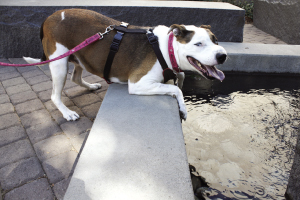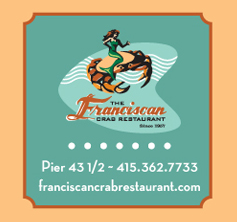
Jazzy contemplates doing a cannonball into the fountain at UC Davis
photo: Iris Rowlee
photo: Iris Rowlee
I wrote about Blue in my October 2009 column, “The luckiest pups in Bakersfield.” She and her two sisters came from the horrific high-kill Kern County shelter, where they had a date with the needle scheduled for Father’s Day morning. The shelter coordinator had fallen in love with the three puppies; they had been there since an idiot backyard breeder dumped them at just 8 weeks of age. But it had been two months at a shelter where dogs usually get two days, and with no adopters in sight, she couldn’t justify keeping them alive any longer. When Rocket Dog Rescue informed the Kern shelter coordinator they had a transporter picking up some dogs that Sunday morning, she pleaded with them to take the three puppies, but the transporter didn’t think they would fit in the van. I told her that if she could fit the puppies, I would foster them. Fate intervened: the car rental company accidentally gave away the van reserved for Rocket Dog and offered a larger van – just large enough to fit the three four-month-old little girls. That warm June afternoon, Steve was waiting in my backyard when I brought the sisters home. “The little grey one is cute,” Steve said over a martini. Two cocktails later, he went home with a puppy.
Blue is now almost two years old (her sisters also found wonderful homes), and she and Jazzy are the best of friends. We stopped at that same overgrown field about 15 miles from Davis where Jazzy had chased ground squirrels. A handwritten “For Sale” sign led people to rightfully assume the land wasn’t actively managed, so it had become a graveyard for unwanted objects – on our first visit we found an old TV and this time a broken-down organ. Jazzy and Blue galloped across the hot, dry ground, bounding from bush to bush in search of lizards and rodents. It seemed unfathomable from her energy level that Jazzy had cancer. Periodically she would look up to make sure I wasn’t too far away, tongue hanging out the side of her mouth and a huge pittie grin on her face.
Upon our arrival at the small animal hospital, the Davis dental team immediately surveyed their work and were pleasantly surprised that Jazzy’s mouth had completely healed in just seven days. They sent us over to the oncology building, where we were told to wait for a Dr. Kent. “He’s running behind,” a student informed us. “Feel free to sit out by the fountain, and I’ll come and get you when he’s ready.”
She didn’t have to say “fountain” twice to Jazzy – she’s obsessed with water. In 100-degree weather, we sat under shade trees by a sleek, modern pond made from blocks of granite with waterfalls that Jazzy couldn’t resist trying to capture with her tongue. It was a struggle to keep her out of the pond all together and, of course, just as the student walked up, I lost that struggle as Jazzy jumped in with gleeful abandon like a fat kid doing a cannonball.
“She’s adorable,” the student said (though I’m sure she was a bit horrified), and led us into an exam room where we waited another five minutes, though it seemed like an eternity. When the door finally opened, a young, handsome man wearing Clark Kent glasses and a white coat swept in. “I’m Dr. Kent, and I’ll be handling Jazzy’s case,” he said, opening her file on the stainless steel exam table. “I’ve read everything, and I’d like to start treatment Wednesday.”
Steve and I looked at each other, stunned. “This Wednesday?” I asked.
“Yes, day after tomorrow,” Dr. Kent said matter-of-factly. “We’re going to do sixteen treatments …”
I shook my head, confused. “No,” I said, “I’ve opted for four treatments, once a week for a month.”
Dr. Kent looked concerned. “I can’t advocate that for a dog this young,” he said sternly.
I felt my head start swimming. “But that’s what Dr. Theon recommended – or at least I thought that was what he recommended … honestly, with his French accent, he was hard to understand – but ...”
Sensing my confusion, Dr. Kent walked around the steel table and sat down cross-legged on the floor with Jazzy. Immediately she swooped in for her famous stealth kisses, and he stroked her ears gently. “I know, girl,” he said softly. Then he turned his attention to me. “I know that sixteen treatments are a big commitment, and it is more expensive, but the risk of complications is much less than with the palliative treatment. If Jazzy were a human, we wouldn’t even be talking about palliative, because it wouldn’t be available. With the large, single doses there is a 30 percent chance of severe complications, such as necrosis, down the road. With the sixteen smaller doses, it’s two to three percent.”
As Dr. Kent spoke in his gentle, confident manner, I felt my confusion melt away, and for the first time since this ordeal began, I had hope. “I would hate to see Jazzy come back for her two-year check-up and have it be the complications that kill her rather than the cancer.”
Wanting to make sure that I heard him correctly, I asked, “Two years?”
Dr. Kent smiled reassuringly. “Jazzy’s a young dog. Fibrosarcoma is a very aggressive cancer; a very difficult cancer, and there are no guarantees because we’re not God – we don’t know if or when the cancer will return – but the smaller doses over a longer period of time are much safer. Palliative treatment is really for dogs who aren’t going to make it, and we want to make their last months comfortable. If the severe complications are going to happen with palliative treatment, they usually happen six months down the road, and the really sick or really old dogs usually don’t survive that long.”
Jazzy sensed the change in my mood and rested her head on my knee with a sigh, her big, blue eyes still staring at Dr. Kent. “What time should we be here on Wednesday?” I asked, and at that moment Dr. Kent started looking less like Clark Kent and more like Superman.
After going over the particulars, I realized that Jazzy would need to be at the hospital three hours a day for more than a month. Driving back and forth between San Francisco and Davis every day simply wasn’t practical. What made the most sense, I decided, was to book a room at the Stone Villa motel, just five minutes away, and move to Davis.
That evening on the drive home, my mind was reeling with everything I needed to do the next day to prepare for our new life. Jazzy and Blue were curled up in the backseat together, blissfully oblivious.
“Did you hear him say two years?” I asked Steve. “I did indeed,” Steve smiled, his eyes still focused on the road. As the sun slid behind the fields and farms, a peaceful quiet fell over us, broken only by the snoring of two very lucky pups.
“Jazzy halts flow of tears with toys and tenacity, the story of how Jasmine helped Susan get through the death of her father,” appeared in the San Francisco Chronicle in Eileen Mitchell’s “Pet Tales” column Dec. 8, 2010 (www.sfgate.com/columns/pettales/archive/ ). Susan is currently working on a book based on this column.
E-mail: jasmine@northsidesf.com








